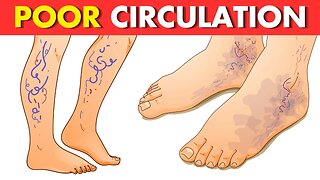Premium Only Content

Ulcerative Colitis Diet: What to Eat & What to Avoid
Recently on our channel, we talked about some causes and reasons for constipation. Have you watched the video yet?
Did you know that colitis is one of the causes of constipation? It is characterized by intestinal inflammation, with symptoms such as diarrhea, presence of mucus or blood in stool, abdominal pain, fever, dehydration, and flatulence.
Caused by infectious means, such as virus, bacteria, or parasites, colitis can be divided as: ulcerative, ischemic, pseudomembranous, and even idiopathic (no defined cause).
Besides, colitis can also be categorized as acute, which lasts more than a week, and chronic, that lasts less than four weeks.
The most common is the infectious kind, especially by food poisoning. It is important to pay attention to where we eat.
Generally, a person who suffers from colitis should not follow restrictive diets and needs to adapt their diet according to the severity of the disease and symptoms.
It is necessary to observe how the body reacts to every food eaten to learn to identify which foods trigger the symptoms of colitis.
Are you enjoying the video so far? Leave a comment to let us know if we are contributing to inform you. Don't forget to like the video and share it with your friends!
If you are going through it, you should opt for specific foods. Watch the video to learn more!
You are also going to learn some of the foods you must avoid if you have colitis.
If you have any symptoms of colitis, immediately seek a doctor or gastroenterologist to have your situation analyzed.
Avoid foods that have insoluble fibers, like the peels of fruits and vegetables, to not stimulate the intestines and aggravate the issue.
Avoid also fermented beverages, such as beer, wine, and champagne.
----------------------------------------
Facebook: https://bit.ly/38BWbw3
Pinterest: https://bit.ly/2Irvwa6
Disclaimer: The materials and the information contained on Natural Cures channel are provided for general and educational purposes only and do not constitute any legal, medical or other professional advice on any subject matter. These statements have not been evaluated by the FDA and are not intended to diagnose, treat or cure any disease. Always seek the advice of your physician or other qualified health provider prior to starting any new diet or treatment and with any questions you may have regarding a medical condition. If you have or suspect that you have a medical problem, promptly contact your health care provider.
-
 4:50
4:50
Natural Cures
1 year ago $1.11 earned5 Warning Signs of Poor Circulation and How to Fix It
3.22K1 -
 1:25:45
1:25:45
Kim Iversen
13 hours agoIvermectin: The Hidden Treatment for Cancer They Don't Want You to Know About
107K151 -
 2:14:44
2:14:44
TheSaltyCracker
11 hours agoTrump Takes AXE to DC ReeEEeE Stream 02-12-25
183K261 -
 1:20:54
1:20:54
Glenn Greenwald
14 hours agoTrump, Hegseth Signal Negotiations to End Ukraine War; The Nursing Home Patients Who Run DC: With Daniel Boguslaw | SYSTEM UPDATE #406
121K59 -
 1:07:48
1:07:48
Man in America
13 hours agoGold Standard 2.0? The ECONOMIC EARTHQUAKE That Will Change EVERYTHING!
122K23 -
 2:57:15
2:57:15
I_Came_With_Fire_Podcast
12 hours agoTrump Ends Ukraine War? | FEMA Houses Migrants, Forgets Americans! | Treason In The FBI?
64.8K8 -
 1:07:44
1:07:44
Adam Does Movies
17 hours ago $5.74 earnedHow To Get A Movie Made In This New Era And Is It Worth It? - LIVE!
72.7K3 -
 55:29
55:29
Flyover Conservatives
1 day agoMEL K | We’re WINNING, But The Globalists REFUSE to Back Down—Here’s What’s Next! | FOC Show
65.7K7 -
 14:54
14:54
BlackDiamondGunsandGear
16 hours agoIs this BUDGET Optic WORTH your $$$ / Gideon Optics Advocate
46K2 -
 2:25:08
2:25:08
Space Ice
15 hours agoSpace Ice & Redeye: Seagal's Born To Raise Hell & Movie Ideas Feat Alex Lantz
50.9K1